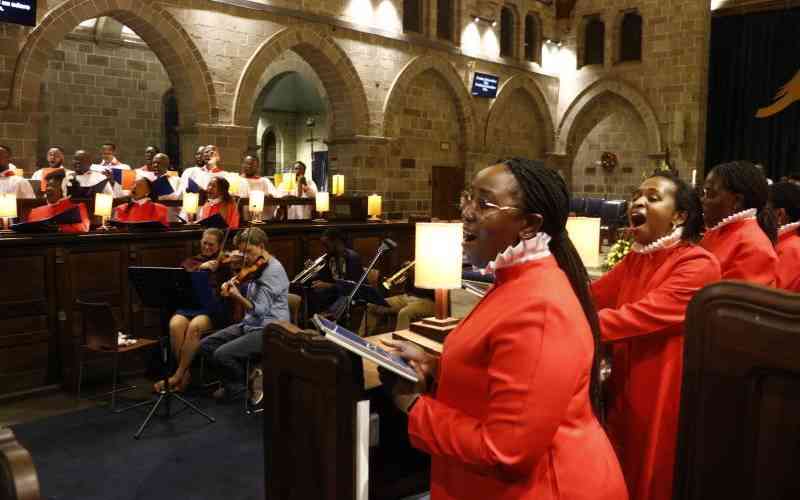 |
|
Wanjiku Muhia, Nyandarua Women Representative PHOTO: COURTESY |
By ROSELYNE OBALA and WILFRED AYAGA
Nairobi, Kenya: Women leaders have reacted with anger to the passing of the Marriage Bill by their male counterparts in the National Assembly this week.
The passing of the contentious Bill has been termed an infringement on the rights of women and persons with disabilities.
A section of women legislators accused their male counterparts of being insensitive and ignorant to their plight and that of maginalised persons.
They argued that male MPs ganged up to pass amendments to suit their needs, confirming they are against women’s progress.
Nominated Senator Godliver Omondi accused male parliamentarians of using “tyranny of numbers” to deny them a chance to have a say in the marriage institution.
“I am disappointed and annoyed. What the male legislators did is unfair especially to persons with disabilities who are also affected by the Bill,” she said.
Nominated Senator Beatrice Elachi also registered her disappointment, charging women gains are being reversed.
She accused Majority Leader Aden Duale of failing to show leadership on the matter and instead resorted religious arguments.
“He should have at least taken a back seat and allowed another lawmaker to champion the changes. His position is taken as that of the Government and by supporting the amendments, women had no way of registering their concerns,” she said.
“As much as we must protect our traditions, legalising polygamy is not the way to go. How many women will afford a church wedding to protect their marriage?” she questioned.
“The Muslim colleagues came out strongly to protect their religion, yet our Christian brothers did very little to do the same,” she said.
Equal chance
Wanjiku Muhia (Women’s Representative, Nyandarua) and Florence Mutua (Women’s Representative, Busia) argued that the Bill has good aspects but petitioned President Kenyatta not to assent to it.
The two urged the President not to assent to the Bill, until clause 11 and 12 touching on the mentally disabled is addressed.
Stay informed. Subscribe to our newsletter
“We want the law to define at what level the person is declared insane and this should be done by a qualified medical doctor who will examine the individual and determine the condition to prevent one from entering into a marriage contract,” said Muhia.
She argued that lawmakers should refrain from being judgmental and instead give all Kenyans an equal chance without subjecting them to any form of discrimination. “The controversial clauses should be looked into before the Bill is signed into law,” stated Muhia.
Muhia concurred with Senator Elachi that the Bill should be to re-introduced in Parliament within six months after they have adequately lobbied their counterparts.
“We were not short of a strategy to shoot down the Bill, it is only that most of us were away on official assignment but the few who were around did their best,” she said.
Mutua faulted the changes made to the Bill, especially article 44, which now makes it mandatory for all forms of marriages to be registered.
She cautioned that this will create an avenue for corruption.
“Customary marriages just as Islam are recognised by the law and therefore there is no need to seek registration again. Applying for the certificate will only provide a chance for people to make money,” she warned.
She added: “Many women at the grassroots might lack funds to register it and this will lead to corruption as the documents might be bought or forged unless the process is devolved.”
Mutua argued that defining in law at what level a person might be declared insane is key or else many people will be discriminated upon if the Bill is signed into law in its current form.
Priscilla Nyokabi (Nyeri) has maintained that it was important that the amendments be defeated for the sake of family unity.
“If you choose to marry, it is important that you inform the other woman that you are coming in with another person. For the sake of cohesion it is important to inform all the parties,” she said Nyokabi argued that the Bill in its current form will expose underage girls to exploitation.
“If we allow that children are going to marry at an early age due to laws of other faiths, it would be unfair. We must protect the rights of children,” she told the House.
Regina Muia (Kilome, Wiper) has vowed to mobilise women all over the country to push for further changes that will recognise women’s’ role in marriage.
Sexually exploit minors
“What the men have done is not good for our families. We will mobilise women all over the country to ensure our rights are not breached,” she said.
She warns that the change would disadvantage women who cannot afford a church ceremony.
“Not all women are able to organise marriages in church. The law is not for us only. It is for all women in Kenya. We’re not going to favour men. This Bill is for women,” she said.
Narok Women’s Representative Sopian Tuya argued that the men might seeking their wives’ consent to take another wife but for the same of peace it is important.
“At the end of the day if you are the man of the house, and you choose to bring in another party (and they may be two or three), I think it behooves you to be man enough to agree that your wife and family should know,” she argued.
Retrogressive law
Justice and Legal Affairs Committee Chairman Samuel Chepkonga moved the amendment to the Bill to remove a clause that had recommended that marriage of people of any other faith and beliefs could also be recognised, a clause MPs said could be abused.
MPs have made it mandatory for those who want to stop a Christian marriage to put their reasons in writing despite opposition by women MPs that it might discriminate against Kenyans who don’t know how to write but have valid reasons to stop the intended marriage.
Other women representatives who had earlier rejected the proposed changes affecting women in included Taita Taveta Women’s Representative Joyce Lay.
She said it would be ironical for the Jubilee government that campaigned on the platform of gender mainstreaming to allow such backward legislations.
Kisii Women’s Representative Mary Otara and her Nyamira counterpart Alice Chae urged the President to stop any move that would put portray as the leader who oversaw the reversal of women gains.
 The Standard Group Plc is a
multi-media organization with investments in media platforms spanning newspaper
print operations, television, radio broadcasting, digital and online services. The
Standard Group is recognized as a leading multi-media house in Kenya with a key
influence in matters of national and international interest.
The Standard Group Plc is a
multi-media organization with investments in media platforms spanning newspaper
print operations, television, radio broadcasting, digital and online services. The
Standard Group is recognized as a leading multi-media house in Kenya with a key
influence in matters of national and international interest.
 The Standard Group Plc is a
multi-media organization with investments in media platforms spanning newspaper
print operations, television, radio broadcasting, digital and online services. The
Standard Group is recognized as a leading multi-media house in Kenya with a key
influence in matters of national and international interest.
The Standard Group Plc is a
multi-media organization with investments in media platforms spanning newspaper
print operations, television, radio broadcasting, digital and online services. The
Standard Group is recognized as a leading multi-media house in Kenya with a key
influence in matters of national and international interest.








